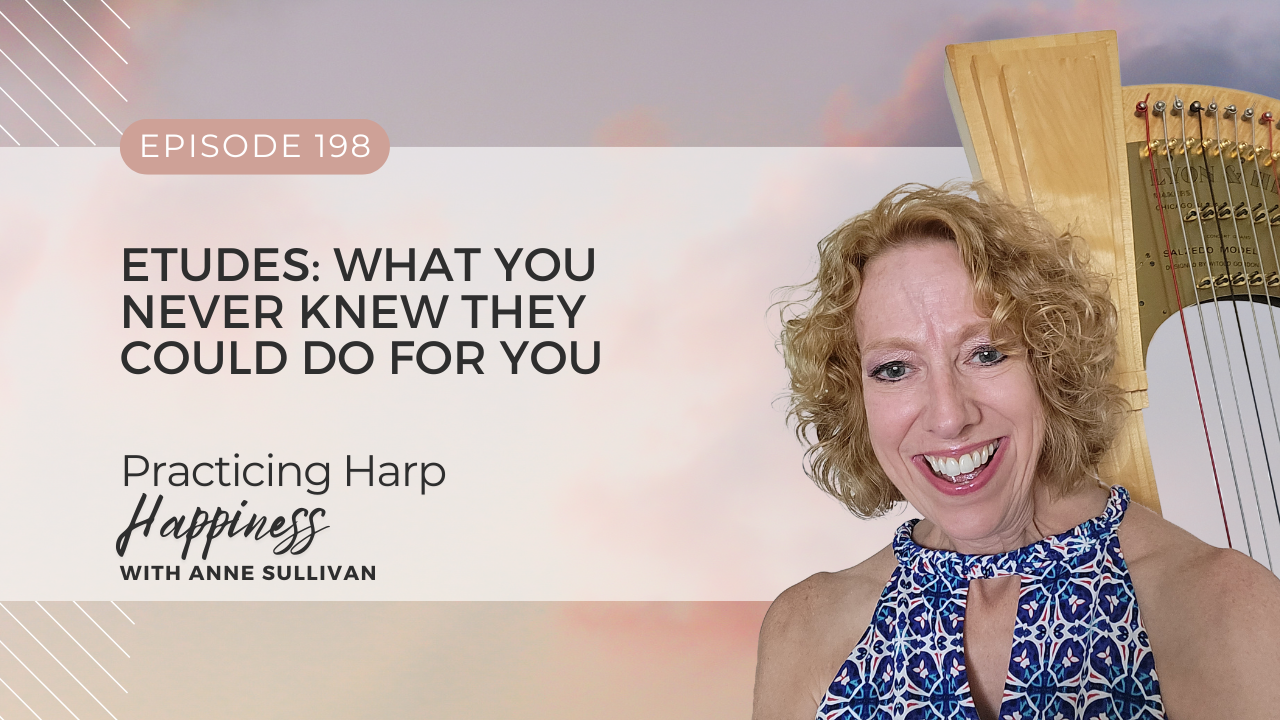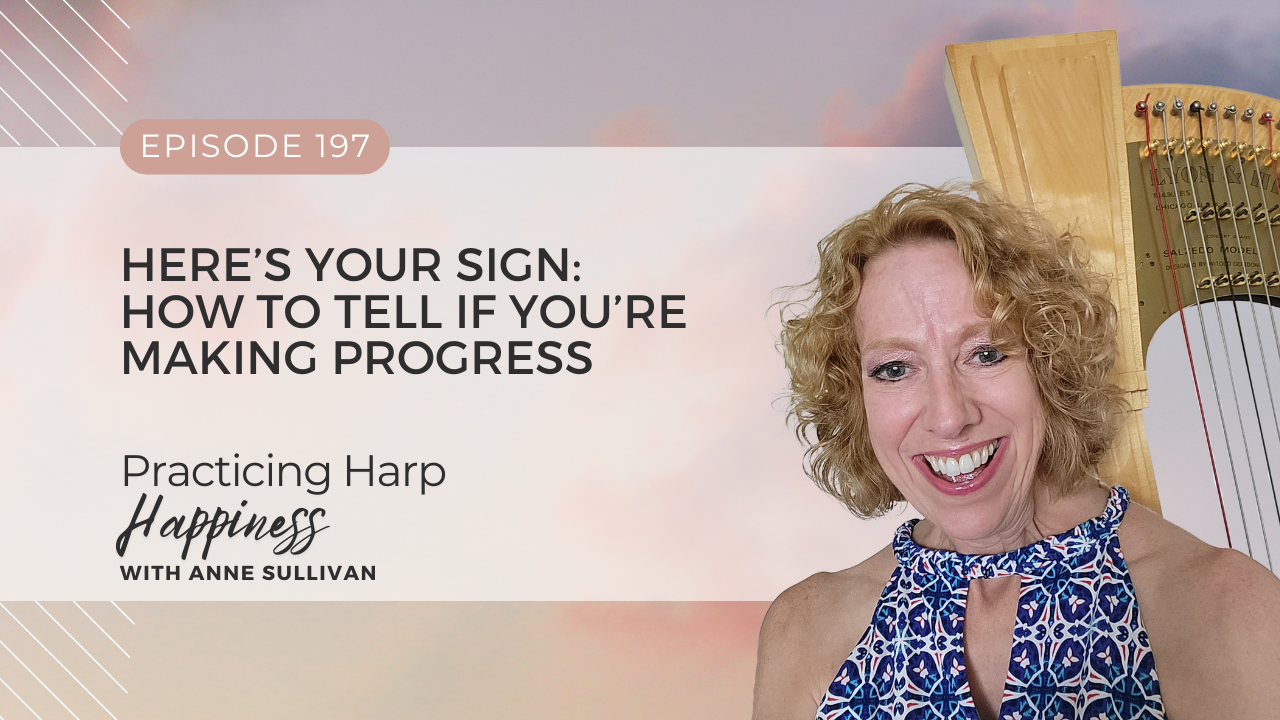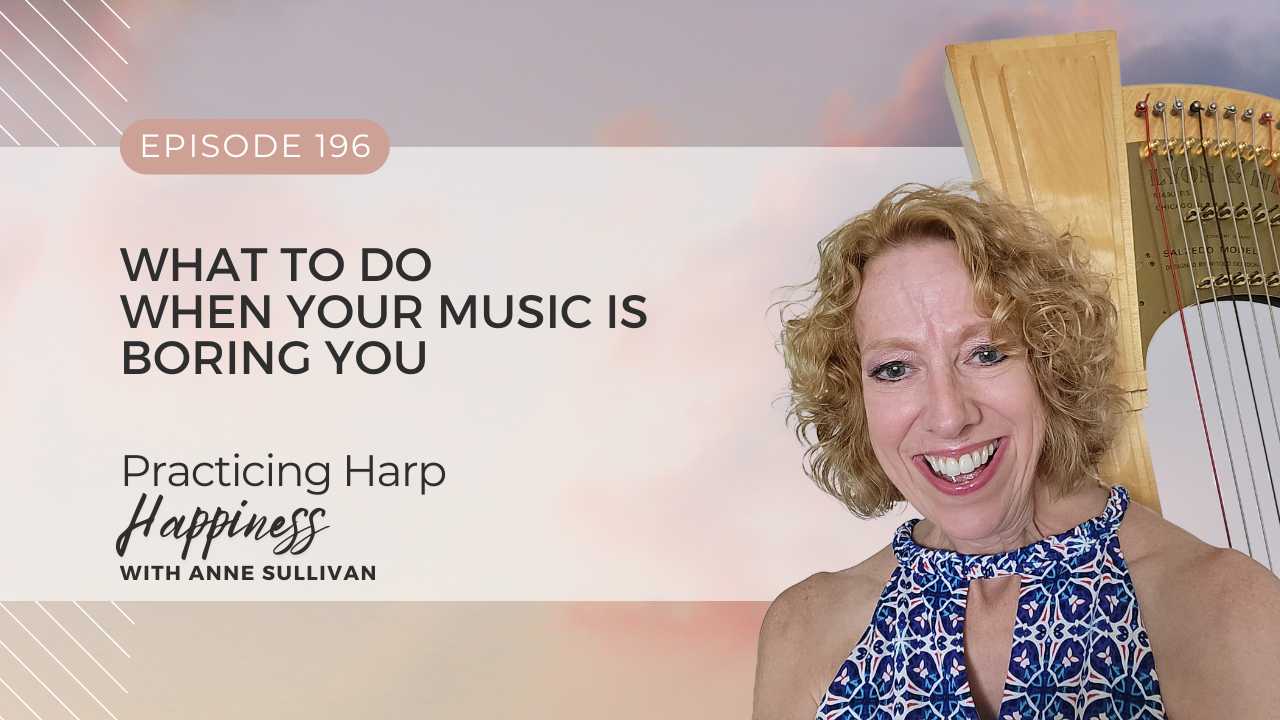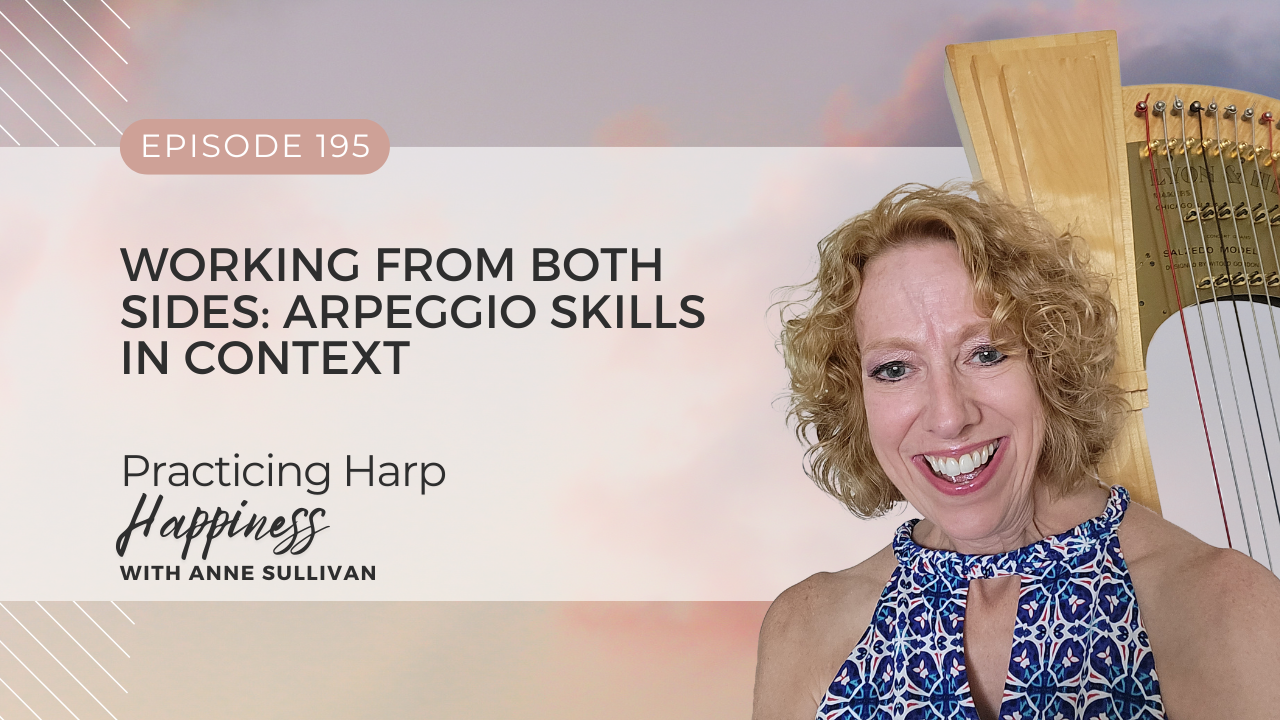Practicing Harp Happiness
#198: Etudes: What You Never Knew They Could Do For You

Fact number one: harp technique is hard. That’s a given. Making our fingers steady, stable and strong enough to play in mid-air, defying gravity with every pluck, is very challenging. That’s a fact.
Fact number two: our technique is a major factor in our playing. It enables us to play the music we want to play. Or it limits us. If our fingers can’t play it, we can’t play it. It’s that simple.
Fact number three: If you feel like your technique is holding you back, there are ways to fix that. And today I want to suggest two ways you might not have explored. These are two ways to use etudes and I think you will find that what we’re talking about today is not the usual etude practice.
I often talk about etudes as the missing link between the exercise drills that we do and the music we play. They provide a way to use a single technical skill like a specific fingering pattern in a musical context that is not as complicated as a regular repertoire piece. Practicing etudes in this way al...
#197: Here’s Your Sign: How to Tell if You’re Making Progress

The day this podcast episode is released, we will be living Day 55 of this year 2025. According to the calendar, we’ve already had 55 days this year to get things done, to grow, to accomplish. We’ve had 55 days to play the harp.
If you set goals at the beginning of the year, this is a good time to check in on them. Are you where you thought you’d be? Are you ahead of the game, checking things off your list and moving on to your next steps? If you are, here’s a huge high five from me. That’s the way to create harp happiness.
Today we are going to revisit your goals. We’ll look at how far you’ve come, confirm your direction and realign your course if necessary. We will focus on the progress you’ve been making and where your next steps may be.
But if you haven’t seen the progress you had hoped for or expected, no worries. Progress is tricky to measure and sometimes hard to spot, even when it’s happening. When you’re walking the path, you can’t always tell how far you’ve come or how ...
#196: What to Do When Your Music is Boring You

They say that familiarity breeds contempt. Unfortunately, familiarity also breeds secure and confident music. We want to play our music well, and so we need to know it inside and out. That takes time.
Learning music also takes time. And the longer we take to learn our music, the harder it can be to stay interested in it. No matter how much we love a piece of music, it is possible to get bored with it.
Also, there are times when we are required to learn a piece that we don’t really like, perhaps for a performance or an exam. Practicing a piece we don’t like can feel like torture.
I believe there is no upside to playing or practicing a piece you are bored with. If you’re trying to learn it, your practice won’t be focused; your heart won’t be in it. If you’re performing it, your lack of interest in the piece will communicate itself to the listener. It might be a flawless performance but it won’t have you - your personality, your energy - in it, and those are the things that bring a...
#195: Working From Both Sides: Arpeggio Skills in Context

When I was a kid, even before I had started harp lessons, I used to go to summer camp in the mountains. I grew up in the Philadelphia area, and the closest mountains to us were the Pocono Mountains. These aren’t mountains by Rocky Mountain standards, not nearly as high, peaked or impressive, but they are beautifully wooded and green, with rivers and lakes.
In order to get to summer camp, we had to drive through the Lehigh Tunnel which fascinated me. Driving through an actual mountain was a little scary. Of course, the scariness was part of why it was my favorite part of the trip.
Tunnels are truly an engineering miracle, in my opinion, especially considering that tunnels can be drilled from both sides to meet - if the calculations are correct - in the middle.
The earliest known example of a tunnel that was dug from both sides is the Tunnel of Eupalinos, in the Greek isles, constructed in the 6th century BCE. WIth pickaxes, chisels, hammers and shovels, two teams dug through Mou...
#194: Everyday Opportunities to Grow and Discover

When my husband and I moved into our new house four years ago, we were moving from a very small house that was part of our business in the mountains to a nice, roomy house in a neighborhood. When we moved to the mountains, we had too much furniture to fit in the little house; for instance, we had dining room furniture but the house had no dining room. We had to put the furniture that wouldn’t fit in storage.
When we moved to the bigger house, though, we were able to bring it all out again. It was a little like Christmas or at least meeting up with old friends. But there were some spaces in the new house that needed furniture that we didn’t have, and one of the things we decided we would like to get was a desk, specifically, a desk with pigeon holes for sorting papers and a lid that closed, so we didn’t have to look at those papers all the time.
Pigeonholes are great for organizing papers or mail or stamps or paperclips. They keep everything in their proper place. They keep the ri...
#193: Making Connections: Harpist Composer Sophia Dussek

Today’s episode focuses on the music of harpist, singer and composer Sophia Dussek. It is partly music history, partly harp history and partly harp technique. But it’s really about connection. I want to help you feel a connection to our roots, to some of the musical and harp traditions that aren’t merely history, but are part of the fabric of our daily harp playing.
There’s an African proverb that says,”Walk like you have 3000 ancestors walking behind you.” We harpists so often feel that we’re all alone on our journey. The truth is that we are only the newest leaves on a tree with many other branches full of other leaves, a tree whose roots were formed long ago. Every time we play, we are continuing the traditions of those harpists, so it makes sense to learn a little bit about them. The things we learn about our roots can help us connect to the music we are learning today in a deeper way.
That’s why I chose “connection” as the fifth of the five growth areas I identified in my bo...
#192: What a Harp Newbie Needs to Know (and the rest of us need to remember)

Do you remember when you were a harp newbie? Maybe you still are, or maybe you’ve been playing for a long time and the time you were a beginner is a distant memory. That’s me, of course, I was a harp newbie a very long time ago. However, I can remember clearly the excitement I felt in my early days of harp playing.
You may have heard my harp story, but here’s the short version in case you don’t remember: Apparently, I heard the harp on the radio when I was two years old, asked my mother what it was, and told her that was what I wanted to do. I don’t remember that part, but I do remember my first harp. My parents had gotten some very good advice and started me with piano lessons when I was four, with the understanding that I could start harp lessons when I was eight years old, if I still wanted to play the harp by then.
So - no surprise - when I was eight I got my first harp, a Lyon Healy Troubadour. I had a very high stool to sit on too. That was the beginning for me of a very lo...
#191: The Technique Triangle: Fingers, Flow and Faith

What do fingers, flow and faith have to do with each other? Absolutely everything. The three things are totally interdependent. You can think of them as three corners of a triangle, each corner being connected to each of the other corners. And, just like the legs of a three-legged stool, all three support your playing.
I’m guessing you haven’t thought of these three elements together before, or how together they form the core of your playing, so I’ll give you a quick sketch of what we’re going to talk about today. Also, I should be clear that we’re not talking about religious faith on the podcast; we’re talking about trusting yourself.
The idea is this: your technique, your fingers, produce flow and give you faith or confidence in your playing. You have to have faith in your fingers doing what you have trained them to do, because they really don’t need you to micromanage them. And you have to have faith that the flow of the piece is what you need to communicate the music. And foc...
#190: Transforming Your Practice in 2025

Happy New Year! I’m excited about 2025. I’m excited about all the harp happiness that you and I can add to the world together. I’m excited about the harp goals that I am putting in place for myself this year. And I’m extra excited about the opportunity to talk with you about your goals today.
We aren’t actually going to be talking about goals as much as we will be talking about the most important step you will take toward achieving them. Of course, there are a lot of things that are important to the success of your harp goals: your motivation, your time, your choice of goals, whether or not you are working on your goals alone or with the support of a teacher or coach. But perhaps the single factor that is most important to accomplishing any type of harp goal is this: your practice.
Without practice, your harp goal is just an idea. Practice is the engine that drives your goal. Whether you want to improve your technique, develop a repertoire, play a concert, learn to improvise, spe...
#189: Multiply Your Growth in 2025 - 5 Key Factors

We are in the final days of 2024, and I, for one, am looking forward to the new year. Every year, as December draws to a close, I am intrigued by the mysterious possibilities that may lie ahead. What opportunities will I discover? What challenges will I need to overcome? Who will I get to meet or know better this year? I am always excited to start the new year, and I hope you are too.
I’m also setting goals for the new year, planning new projects and creating new ways to grow, not just for the harpists in our various Harp Mastery® programs but for myself as well. I have so many ideas that it’s hard to choose which are the key ones to focus on, but over the years I have found that limiting myself to a few goals is critical. If I have too many goals or plans, none of them get the focus they need. On the other hand, if I don’t plan at all, things tend to drift, and I don’t make any real progress. But once I choose my goals, I need to figure out how to accomplish them.
I have a sort o...

